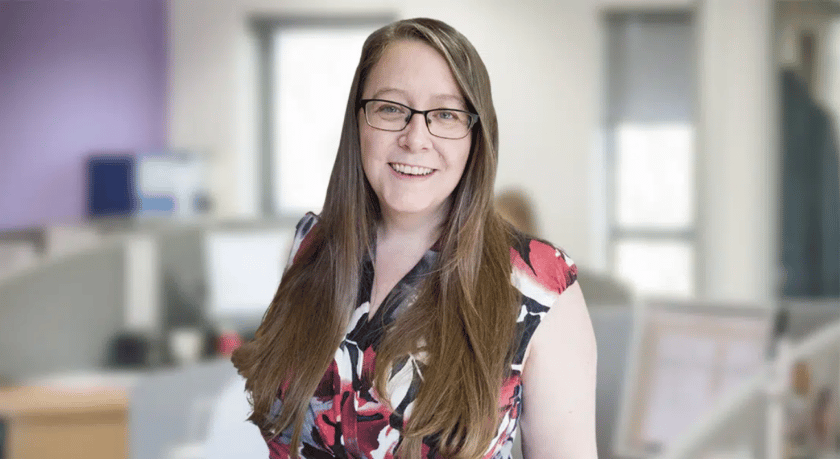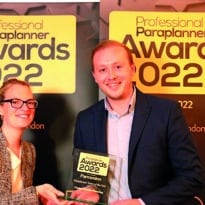Schools and colleges should raise awareness of paraplanning as a profession in its own right to encourage younger people into the profession, Kate Morris, financial planner at Paradigm Norton tells Fiona Bond.
While many school leavers are familiar with financial advice and accountancy as potential career paths, the role of paraplanner remains altogether less well known.
“There are dedicated paraplanning qualifications and I would love to see these qualifications talked about in schools and colleges,” says Kate. “I think a lot of young people possess the skills to do really well in paraplanning but they’re not even aware that it exists and that needs to change.”
It’s often the case that paraplanners ‘fall’ into the career by starting off in a financial advice firm in another role and being offered the chance to train internally. It is a journey that Kate herself is familiar with, having begun her career as an administrator. After honing her administration skills, Kate felt she wanted to pursue something “meatier” that would give her further opportunities to learn and progress.
“On returning to the UK after living in Holland for four years, I joined a firm as an administrator but I quite quickly felt like I needed something a bit meatier to get my teeth stuck into. I was very fortunate that the company I worked for believed that I had the aptitude and ability required to progress to paraplanner and supported me in working towards my qualifications. But I would like to see it become a more thought-about career path for future generations,” says Kate.
From there, Kate moved to an advice firm where she worked as paraplanner to two SOLLA-accredited advisers and studied towards her Diploma in Regulated Financial Planning, which she achieved in 2018. It was, for all intents and purposes, a baptism of fire but one that inspired an interest in later-life care, encouraging Kate to complete exams in Long Term Care, as well as Equity Release and Mortgage Advice, before joining Bristol-based Paradigm Norton in 2021.
Supporting specialisms
Through her work, Kate has developed a passion for later-life care and would like to see other paraplanners encouraged to develop specialisms within their chosen field.
Kate says: “It’s important that every paraplanner has the basics and can understand and work across a client’s full spectrum of advice needs but it would be great if there was more focus within firms to help paraplanners find their area of expertise.”
For Kate, long-term care appealed to her desire to help people at a difficult time. She explains: “People come to you at a very vulnerable time of their life. It’s often children coming to seek help and support for their parent’s care and being able to offer that level of reassurance at a difficult time is very rewarding.”
When faced with the prospect of needing to pay for later-life care, many relatives are often unsure how they will be able to afford it and emotions can make the task even harder.
“When you’re staring at a pot of money, it can be difficult to know where to start,” says Kate. “It’s lovely to be able to be able to work out their options, show them what’s available to them and remove that financial worry at an already-difficult time.”
People skills
For Kate, the ability to understand and empathise with clients is a key part of becoming a successful paraplanner.
“From an outside perspective, paraplanning looked like it was very much all report-writing but while that’s an important aspect, paraplanners need to demonstrate a much broader set of skills.
“You absolutely need to be good at maths and have a head for figures but it’s also important to be able to look at the bigger picture. Paraplanners shouldn’t just look at the information at hand but consider the wider objectives of the client and how that all ties together,” she says.
Paradigm Norton actively encourages its paraplanners to engage with and nurture client relationships, attending meetings and having input in those meetings.
She says: “A lot of things like body language or facial expressions can really help you to understand how a client truly feels about a situation that would be very difficult to convey in notes. I think it’s a much better approach to allow paraplanners to build relationships with their clients and develop a deeper understanding of what’s important to them.”
Organisation is also key, particularly for paraplanners expected to deal with lots of different clients. For Kate, that entails having efficient processes in place that both advisers and paraplanners are familiar with and understand.
“Everyone needs to be able to follow those processes and be singing from the same hymn sheet,” she says. “I’m very fortunate that I work with two great advisers who are very organised and we all understand what is expected of us to make things run smoothly and efficiently.”
At Paradigm Norton, paraplanners are encouraged to share workload if they are extremely busy and a colleague has capacity and Kate says it’s important to have the confidence to ask for help or put forward suggestions of how to do things in a better manner.
“If an adviser isn’t signing off reports in a timely manner, paraplanners can end up with a bottleneck. As a first step, it’s important to raise the issue with the adviser directly. It may be that they’re struggling and would benefit from sitting down with their paraplanner and prioritising what is most urgent,” she suggests. “If that doesn’t resolve the issue, don’t be afraid to stick your head above the parapet. There are lots of people within a firm who may be able to help you with your workload, for example the operations manager (if you have one). Paraplanners should also always utilise the skills and resources of the administrator who often has quicker access to details and log ins.”
When it comes to questions about clients, Kate recommends compiling queries and requesting a meeting with their adviser to go through everything in one go.
“Advisers are busy and making sure you allocate that time to get everything answered in one go is much more time-efficient and less disruptive to everyone. Having a good rapport with the advisers you work with does make a huge difference,” she adds.
Imposter syndrome
In October, Kate was awarded ‘Paraplanner of the Year’ by the Chartered Institute for Securities and Investment, who commended Kate for her “admirable depth of knowledge”, particularly around later life planning.
She says the accolade still feels overwhelming, admitting she suffers from Imposter Syndrome.
“It still doesn’t feel real,” Kate says. “It always felt like professional awards were something that happened to other people. I worked very hard on my application and I was really hopeful, but you just never know. I was still unsure until the moment they announced my name.
“I agonised a lot over the case study I was required to submit and I found the final round, which consisted of an interview with a panel of judges, very nerve-wracking. I initially thought I had done well but as with all these things, you do start to question yourself as time goes on.”
Kate described the awards ceremony and winning as a “brilliant” experience and says the award and affirmation that she is doing her job well has boosted her confidence and encouraged her to become more vocal on social media as well as improve her public speaking.
“It’s really helping me to push myself out of my comfort zone. To be honest, even applying for the award was out of my comfort zone!”




























